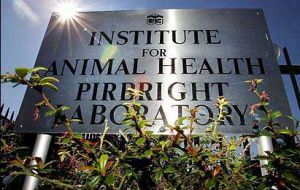MercoPress. South Atlantic News Agency
UK Probes Laboratory as Source for Foot-and-Mouth Outbreak
 We'll have answers in 24 hours Lab sources said
We'll have answers in 24 hours Lab sources said U.K. health and safety authorities extended their investigation into a vaccine laboratory southwest of London owned by Merck and Sanofi-Aventis as a possible source of foot-and-mouth disease after cattle became infected at a farm near the site. Merial Animal Health said that so far no breach in its procedures had been discovered.
The virus found at the farm near Guildford, Surrey, was used in vaccine production last month at a facility shared by the Institute for Animal Health and research company Merial Animal Health Ltd., the U.K. Department for Environment, Food and Rural Affairs said in a statement on its Web site. The strain is similar to one from a 1967 foot-and-mouth outbreak, the department said. The discovery prompted Debby Reynolds, Britain's chief veterinary officer, to expand a protection zone around the farm to include the shared facility site in Pirbright. The last foot- and-mouth outbreak, in 2001, cost the economy as much as 10 billion pounds ($20.4 billion) as meat demand plunged and tourists stayed away from rural areas. Investigations had so far shown ''no breach in our procedures,'' David Biland, Merial managing director, said at a televised news conference today. The strain hasn't recently been found in animals and is similar to those used in international diagnostic laboratories and in vaccine production, the department said. Merial suspended virus production at Pirbright and is working with the U.K.'s environment agency, according to an e- mailed statement from Merial said yesterday. ''It's too early to determine the cause of the outbreak but the initial investigation shows no breaches at our site,'' Merial managing director David Biland said during another press briefing held at the laboratory yesterday. ''We have a complete confidence at our biosecurity procedures and we will do everything we can to support the government investigation,'' he said. Merial has suspended the production if the virus to aid the investigation, Biland said. The company, with 2006 sales of $2.2 billion, is a venture of Merck & Co., a Whitehouse Station, New Jersey-based drugmaker, and Paris-based Sanofi-Aventis SA, according to company press releases and Merial's Web site. The contaminated farm, about 30 miles southwest of London, has been under watch since Aug. 2, when symptoms of the disease were reported to authorities, according to a statement released yesterday. The U.K. has suspended all livestock exports. The 2001 epidemic led to 2,030 cases of foot-and-mouse disease and the slaughter of as many as 10 million animals. Institute of Animal Health Director Martin Shirley said in a televised news conference that there hadn't been any breaches of procedures at the Pirbright facility and that the organization is cooperating with authorities. There are two facilities at the Pirbright site, one operated by the institute and the other operated by Merial, Shirley said. The Institute of Animal Health is one of seven research institutes funded by the U.K.'s Biotechnology and Biological Sciences Research Council, according to the council's Web site. Prime Minister Gordon Brown, Environment Secretary Hilary Benn, Department of Culture, Media and Sport's James Purnell and Reynolds met yesterday to discuss the latest developments. The U.K.'s first priority has been to contain the outbreak by acting ''quickly and decisively,'' Brown said in an interview with Sky News. When asked whether Merial was the most likely cause of the outbreak, he said ''everything will be examined.'' Brown said the virus strain was used on July 16 for manufacturing. Merial said in its statement that it is committed to the highest standards and regulatory compliance. Benn told the British Broadcasting Corp.'s News 24 Sunday program that he has commissioned a review of the U.K.'s biosecurity defenses led by Professor Brian Spratt of Imperial College, London University




Top Comments
Disclaimer & comment rulesCommenting for this story is now closed.
If you have a Facebook account, become a fan and comment on our Facebook Page!